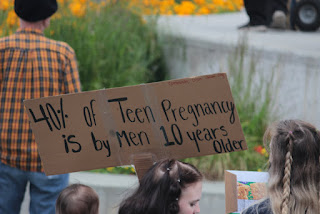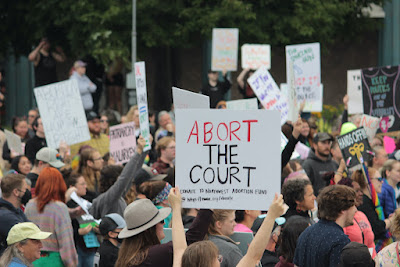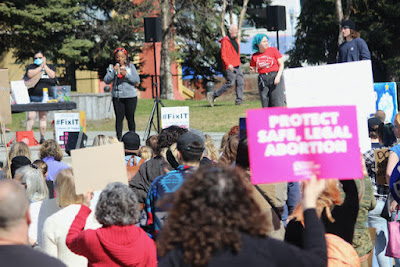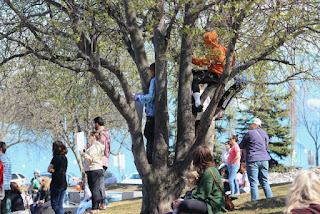Part I was a look at parts of the law itself and the Supreme Court dissents.
I was hoping here to start a list of things to do in response to the Texas abortion law ("The Texas Heartbeat Act"), but I still had questions that reading the law itself doesn't clarify. Articles and comments offer conflicting interpretations. So let me list some of my original questions:
- What's a fetal heartbeat?
- What's the difference between a fetus and an unborn child?
- Who may be sued?
- Who may sue/prosecute someone for performing an illegal abortion?
- Can people be sued for helping Texas women get abortions outside of Texas?
- What are the penalties for performing or aiding and abetting an illegal abortion?
Question #1 Since the law makes hearing a fetal heartbeat the point when abortion may not be performed, medical opinions (which differ from what the law makers apparently intended) on when the fetal heartbeat can be heard may well be significant.
#2 probably does not have significant legal consequences, though people will argue about this endlessly.
#3 The answer appears to be people who help people get abortions and doctors who perform them, but not the women who get abortions. Though 'help' is pretty vague.
#s 4 and 5 are key issues. #4 because the law was designed to avoid being blocked by courts because governmental entities can't prosecute. #4 because the law doesn't seem clear on this.
#6 I'm still having trouble figuring out.
Finally, I suspect that they threw all kinds of crap into this law to:
- See what would stick
- Jam up the courts
- Scare people out of seeking and offering abortions
- Because they could
What's a fetal heartbeat?
This piece From NPR says sonogram 'heartbeats' are really noises generated by the machine and aren't real heartbeats.
"The Texas abortion law that went into effect this week reads: "A physician may not knowingly perform or induce an abortion on a pregnant woman if the physician detected a fetal heartbeat for the unborn child."
"When I use a stethoscope to listen to an [adult] patient's heart, the sound that I'm hearing is caused by the opening and closing of the cardiac valves," says Dr. Nisha Verma, an OB-GYN who specializes in abortion care and works at the American College of Obstetricians and Gynecologists.
The sound generated by an ultrasound in very early pregnancy is quite different, she says.
"At six weeks of gestation, those valves don't exist," she explains. "The flickering that we're seeing on the ultrasound that early in the development of the pregnancy is actually electrical activity, and the sound that you 'hear' is actually manufactured by the ultrasound machine." [emphasis added]
So, will the time frame be challenged to when an actual heart beat and not a synthetic sonogram machine heart beat is heard?
What's the difference between a fetus and an unborn child?
The Texas law definitions include:
"(7)AA"Unborn child" means a human fetus or embryo in any stage of gestation from fertilization until birth."
But (again from NPR):
"In fact, "fetus" isn't technically accurate at six weeks of gestation either, says Kerns, since "embryo" is the scientific term for that stage of development. Obstetricians don't usually start using the term "fetus" until at least eight weeks into the pregnancy."
But, I guess legislatures can create legal definitions that differ from scientific definitions. All you need is a majority.
Who may be sued?
It's clear from the law that the physician performing the abortion and anyone aiding or abetting someone getting an abortion, including paying for the abortion may be sued. But some people think the woman herself can't be prosecuted. The law says:
("b)AA This subchapter may not be construed to:
(1)AA authorize the initiation of a cause of action against or the prosecution of a woman on whom an abortion is performed or induced or attempted to be performed or induced in violation of this subchapter;"
But is that only for that subsection of the law? This AP article agrees that abortion patients can't be sued:
"It allows any private citizen to sue Texas abortion providers who violate the law, as well as anyone who “aids or abets” a woman getting the procedure. Abortion patients themselves, however, cannot be sued."
The following passage from a Texas Planned Parenthood site also suggests the woman herself is exempt:
"This provision lets anyone sue an abortion provider and anyone else who helps a patient access abortion care that is prohibited by SB 8. Anyone who successfully sues an abortion provider will be entitled to at least $10,000 and a court order preventing them from providing abortions in the future."
But what exactly does 'aid and abet' or 'help' mean? If I tell someone where they can get an abortion, is that against the law? Presumably not because the law states:
"(g)AA This section may not be construed to impose liability on any speech or conduct protected by the First Amendment of the United States Constitution, as made applicable to the states through the United States Supreme Court’s interpretation of the Fourteenth Amendment of the United States Constitution, or by Section 8 Article I,TexasConstitution."
Using the logic of Citizens United, people could argue that giving a woman money or an airplane ticket is a form of free speech. (Of course you can argue anything. But it has to persuade the judges.)
There are also some issues that arise because an abortion before the heartbeat is still legal in Texas. What if aid is given earlier but the eventual abortion is later?
Who can sue someone for performing an illegal abortion?
[An attorney friend pointed out, when I used the word 'prosecute' that citizens can sue, but not prosecute. Only governmental units can do that. And probably, but I'm not sure, agencies like Departments of Justice or Legal Departments.]
I think this is relatively clear. No governmental entities can prosecute. Only private individuals anywhere can sue. From Planned Parenthood again:
"That means anyone, anywhere in the country — from anti-abortion protesters to out-of-state lobbyists — can sue an abortion provider, abortion funds, or anyone who “aids and abets” someone seeking an abortion that is prohibited by SB 8, regardless of whether they are directly involved or even know the patient."
Here's the law:
"shall be enforced exclusively through the private civil actions described in Section 171.208. No enforcement of this subchapter, and no enforcement of Chapters 19 and 22, Penal Code, in response to violations of this subchapter, may be taken or threatened by this state, a political subdivision, a district or county attorney, or an executive or administrative officer or employee of this state or a political subdivision against any person, except as provided in Section171.208.
Preventing the state or state subdivisions from prosecuting was done to avoid the law from being blocked by the courts.
However, although they can't prosecute:
(h)AANotwithstanding any other law, this state, a state official, or a district or county attorney may not intervene in an action brought under this section. This subsection does not prohibit a person described by this subsection from filing an amicus curiae brief in the action.
I don't completely understand this, but my understanding is a court could block a government entity from taking action. But it can't block all potential people who might sue, before the fact. That's the logic argued by the five member majority of the Supreme Court.
Can people be sued for helping Texas women get abortions outside of Texas?
My assumption has been 'no.' How could they forbid Texans to do something that's legal in another state? That would be like saying gambling and smoking marijuana are illegal in Texas and Texans can't do those things in states where they are legal. I've searched the new law for the word "Texas" and it shows up 16 times - mainly before Constitution and various Codes. Since women having abortions can't be sued by this statute. They could do this. And since the doctors and clinics aren't in Texas, it doesn't seem likely Texas would have jurisdiction over them. That leaves people who might help pregnant women get out of Texas for an abortion. I'm guessing they just left it vague and are leaving it up to their vigilantes to test this in court. I haven't been able to find this exact question addressed online.
If an attorney or two can clarify this that would be helpful.
What are the penalties for performing or aiding and abetting a women to get an abortion?
There's a minimum $10,000 per abortion performed by doctors for the doctors. And for people who aided and abetted.
(2) statutory damages in an amount of not less than $10,000 for each abortion that the defendant performed or induced in violation of this chapter, and for each abortion performed or induced in violation of this chapter that the defendant aided or abetted;
It gets even stickier:
(2) knowingly engages in conduct that aids or abets the performance or inducement of an abortion, including paying for or reimbursing the costs of an abortion through insurance or otherwise, if the abortion is performed or induced in violation of this chapter, regardless of whether the person knew or should have known that the abortion would be performed or induced in violation of this chapter;
So, first we get "knowingly engages in conduct" but at the end we get "regardless of whether the person knew." Perhaps they mean if you knew you were taking someone to get an abortion, but even if you didn't know it would be an illegal one. So, if you take someone to get a legal abortion, but it turns out there's a fetal heartbeat and the abortion is performed anyway, you would be liable. There is language that says it's "an affirmative defense" if the defendant can prove they conducted research that led them to believe that the doctor would comply with the law. But the proof "with a preponderance of evidence" of that the research is on the defendant.
That can only be intended to stop people from getting legal abortions as well as illegal abortions.
Defendants who win their cases cannot be awarded legal fees.
(i) Notwithstanding any other law, a court may not award costs or attorney’s fees under the Texas Rules of Civil Procedure or any other rule adopted by the supreme court under Section 22.004, Government Code, to a defendant in an action brought under this section.
So if you're wrongfully accused, you still have to pay all your attorney fees. I don't think, though, that if an organization provides free attorneys, they could be sued for 'aiding and abetting.' But maybe only because the legislators didn't think of it.
Conclusions
- The intent of this law was to make it as difficult as possible for women to get abortions in Texas by making it illegal
- to perform an abortion after a fetal heart beat can detected
- to assist anyone trying to get an abortion
- The law was written so that Governmental entities couldn't prosecutors and allowing ordinary citizens to sue. This was done to avoid having the law blocked by a court. (It worked with the Supreme Court's initial ruling.)
- The penalties $10,000 per abortion are high enough to discourage most doctors from performing proscribed abortions and to scare most people from helping women to get an abortion
- Unclear to me is whether the legislators think this will also prevent Texas women from getting abortions outside of Texas
- They probably don't have jurisdiction, but since ordinary citizens will file the lawsuits, there's a good chance that many will even for abortions outside of Texas
- We can only start imagining some of the consequences:
- I've already seen one Tweet where a guy was going to get women pregnant and then claim the $10,000 award for turning them in. (He didn't realize you can't sue the women.)
- This adds to the encouragement of vigilantes that Trump began and we can see predators pursue pregnant women and the people around them
- There will be a surge of revenge law suits filed against people whether they've been involved in a legal abortion, illegal abortion, or no abortion at all
- Planned Parenthood's income will rise steeply
- Rape and incest are not excepted in this legislation. Any man who wants to father as many children as possible will be tempted.
- Relations between sexual partners will change
- perhaps birth control use will go up for women and some men
- men could sue or threaten to sue anyone they think might help their pregnant girl friend or spouse get an abortion, including her parents
- Underground abortions will increase and more women will die from them
- There will be a market for bogus, but profitable, abortion potions/techniques that
- probably won't work
- could harm the mother and/or fetus
- There will be political consequences because a fairly large majority of US citizens approve of abortion. They will become more active running for office and voting
That's just a couple minutes of conjuring up ideas. I'm sure you can think of many I've missed. The next step is determine the most effective ways to fight this law and to help Texas women who need an abortion to get one.
[NOTE: I'm not an attorney. I'm trying to glean from the law itself and from what reputable reporters have to say about the law. I understand that statues are complicated and may seem clear in one section, but there may be another section that voids it. Don't base any medical or legal action on this blog post. It's just my way of sorting out some of the issues.]















































